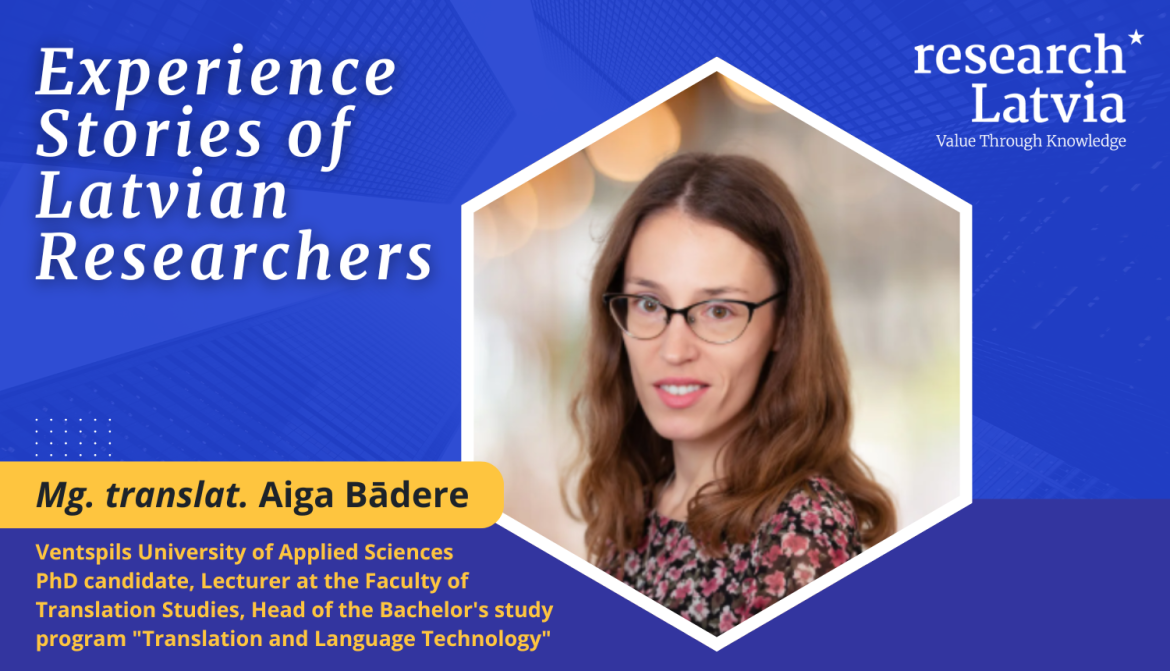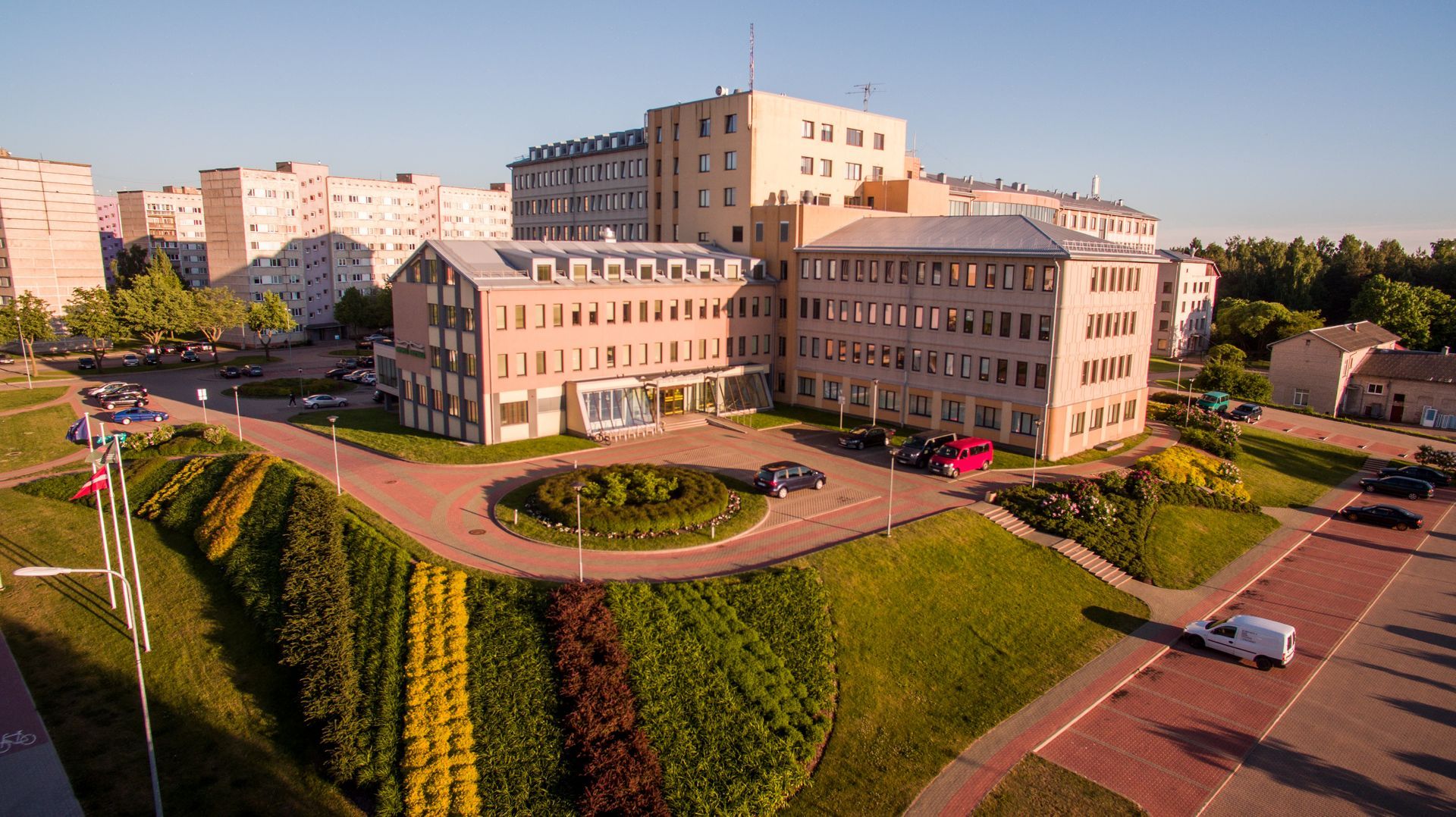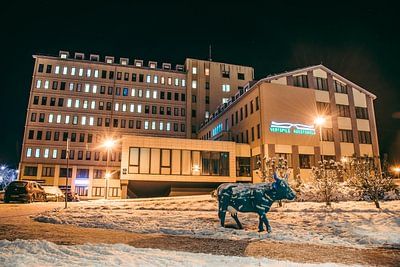With the Mission to Preserve the Latvian Language: the Path of VUAS Researcher Aiga Bādere in Science
Translatology plays an important role not only in the accurate transfer of cross-lingual messages, but also in the preservation of the Latvian language in the digital age. Modern technologies, including machine translation, can affect the quality of the language, so scientists are looking for solutions to ensure the richness and accuracy of the Latvian language. The future PhD Aiga Bādere is a lecturer at the Faculty of Translation Studies of the Ventspils University of Applied Sciences, Head of the Bachelor's Study Program “Translation and Language Technologies” and an experienced translator. ResearchLatvia, a science communication platform created by the Ministry of Education and Science, talks to the researcher whose scientific activity is dedicated to translation studies, namely the post-editing of machine-translated texts, trying to develop a methodological model specifically for the Latvian language.

Currently, A. Bādere's field of activity is quite wide – she combines academic, research work and professional activity. The research interests of the promising PhD of humanities began when she was already studying in high school: "I would say that my life path was quite logical because I was extremely fortunate to study at an outstanding high school – the Ventspils Secondary School of Music. There, I studied music theory in depth, and essentially, we were prepared as future composers or musicologists – who in a way are also scientists. Even then, we had to write extensive course papers and theses that required thorough research and analysis. I believe that it was there that the seed of interest in research was planted – the desire to delve deeper, seek answers, and understand the essence of things. Later, my professional path shifted towards translation, where analytical thinking and understanding of the nuances of language continued to develop.” After obtaining a professional master's degree in the translation of legal and business texts, she turned to doctoral studies to develop a methodological approach to the post-editing of machine-translated texts.
Translation is an extreme immersion, emphasizes A. Bādere. The text can be generated by anyone, and of course it is good if a person does it, but it can also happen without human participation. “The translator will often be the only one who will really understand and analyze the text to the last nuance. In the translation, there is no room for misunderstandings or interpretation according to the feeling –, the translator must always be clear about what is said in the text. He or she is the one who constantly asks questions, looks for precise wording and tries to reflect the author's thought as accurately as possible. Therefore, the translator is not just an intermediary between languages – it is a professional who digs into, analyzes and creates a clear understanding of the text.
Translation is about understanding, accuracy and responsibility,” the humanities researcher admits.
New Opportunities in the Field of Language Technology
Post-editing and turning to translatology closely resonated with what Aiga was already doing as a freelance translator. Today, it is no longer just a translation and editing job, but also a machine translation job, which was a relatively new solution a couple of years ago. “When I was looking for a topic for my second master's thesis, in a conversation with colleagues of the company “Tilde”, we had the idea to focus on the post-editing process –, it was a novelty that developed rapidly. Companies already used it, but each according to their own discretion and regulations. This aroused interest in exploring what is really happening in post-editing and how this process is organized in different environments,” comments Aiga.
Post-editing is understood to mean the processing of machine translated output. “Today, machine translation tools such as “Google Translate” and “DeepL Translator” can translate texts with high accuracy, however, Latvian is a very complex language, also morphologically rich. Neural machine translation in 2015 marked a turning point by providing a machine translation that could really be used in practical work. Until then, machine translations were often too inaccurate and required substantial manual correction, but with the development of neural machine translation, they became more understandable and of better quality. This opened up new opportunities in the field of language technology and rapidly changed the everyday life of both translators and post-editors, explains A. Bādere, lecturer and researcher at the Ventspils University of Applied Sciences.
The research work of the future PhD is important for both translators and language technology developers: “This is the first fundamental study on the post-editing of the Latvian language – this is my contribution so that not only industry professionals, but also society can better understand the impact of machine translation on the language.
Currently, there is a demand from translation companies, including, for example, the Latvian Association of Interpreters and Translators, has invited me to conduct the seminar. This means that the industry has questions about how to better work with machine translation.”
Machine translation tools currently offer texts that are good enough to be used, but not always of high quality. Therefore, the Latvian language is flooded with texts that retain syntactic structures that are not natural for the Latvian language but are more or less adopted from the source text – mainly from the English language. For this reason, in the context of machine translation and post-editing, there is a great deal of talk about language impoverishment.
TTo make the machine better understand the language, the text can be pre-edited, which means standardizing and simplifying it. As a result, language loses diversity – often abandons synonyms, the richness of language expression decreases, and there is a tendency to use uniform formulations.
“If I manage to adapt this model to the Latvian language in such a way that translators can work according to international standards – clearly knowing what is considered a good translation and what needs to be corrected, – it could help preserve the quality of the Latvian language while taking advantage of technology,” says A. Bādere.
The Mission to Preserve the Latvian Language
Aiga participates in the work of the Information Technology, Telecommunications and Electronics Terminology Subcommittee of the Latvian Academy of Sciences, where Latvian language terms are developed and clarified. She emphasizes that in the age of digitization it is essential not to allow language impoverishment: “Machine translation tools often offer acceptable but language richness-losing solutions. Therefore, it is important not to allow the translated texts to lose their naturalness and accuracy, as this will affect the Latvian language as a whole in the long term. The main purpose of machine translation is to speed up work and make information more accessible. However, if we look more broadly at the future of the Latvian language, then its development and adaptation to new technologies is a benefit not only for the industry, but also for society as a whole. Effective machine translation tools allow the Latvian language to maintain its place in the digital environment, promote its usability and ensure that the language develops along with technologies.”
“This topic appealed to me because I realized that machine translation is a distinctly interdisciplinary field. On the one hand, it is related to linguistics and translation studies, and on the other hand, to computer science. When I started researching what has been studied in the Latvian language in this field, I had to face a sharp realization – practically nothing. There are some doctoral theses on machine translation, but their authors are computer scientists who focus on the development and improvement of systems. However, practical users – linguists and translators, also humanities researchers – have not looked from this point of view so far. There have been a few publications, and the first to start writing on the subject were individual translation companies who shared their experiences on their blogs.
However, at the scientific level, this topic has not actually been studied among Latvian linguists and translation scientists so far. Therefore, this thesis is the first fundamental study that addresses machine translation from a humanities perspective. However, it must be admitted that one of the biggest difficulties is the rapid development of the industry – both machine translation and translation in general are constantly changing.
For example, large language models were not yet talked about as something relevant in 2021. At that time, there were only a few doctoral theses in Europe about post-editing – in Finland, Italy, Spain. “As soon as I handed over my draft thesis, after a week I saw a post that there was another new study – just as one colleague from Greece had defended her doctoral thesis on post-editing. However, the uniqueness of my work is that it focuses on the Latvian language – in this context, so far no one else has studied the processes of machine translation and post-editing,” notes researcher A. Bādere.
The researcher has a strong sense of mission – her work is a solution for the Latvian language, and Aiga will be really happy if it is useful for everyone, because there are not so many Latvian language users. She has two doctoral supervisors – one linguist, the other – computer scientist. It should be noted that the number of Latvian language researchers is limited. Our language resources are not comparable to those available in English or other large languages. Therefore, the Latvian language is classified as a low-resource language. Everything depends on how accessible the Latvian language will be in the digital environment. If with my work I can contribute a little to its development and sustainability, then I believe that this is already an important achievement,” says Aiga.
The Role of Digital Technologies in Strengthening the Latvian Language
As is known, there are also many languages that are not available digitally at all. Speaking of language development, a significant benefit is the local company “Tilde”, one of the leading language technology companies in Europe.
A. Bādere outlines future possibilities: “Everything indicates that the availability of the Latvian language in the digital environment will only continue to strengthen.
If it is possible to develop a large language model for the Latvian language, and, as I understand, active work is currently underway on this, it will be another significant step in the development of our language. However, there are things we cannot influence, such as the demographic situation. If the number of Latvians continues to decline, the future picture of the language becomes considerably more bleak. Therefore, it is especially important to use technology to keep the Latvian language alive and active.”
“We have participated in various conferences, including international ones, where the Latvian language is discussed in a broader context. For example, I participated in training in the Czech Republic, where human-machine interaction in language was examined. It was very interesting to understand that, for example, in Greece and Poland, machine translation tools encounter similar problems as in Latvian. The difficulties we face are not unique – each language has its own peculiarities, but there are also common features,” notes the humanities researcher.
As Aiga recalls, one of the machine translation tool developers once said: "We have never said that machine translation tools will replace translators." This is said by marketing specialists, and it is indeed so. The translator's profession will not disappear – it changes and develops, as it has always been. Those who can adapt and develop their skills will continue to shape the future of the industry and raise the prestige of the translator. Human translation will always be the quality benchmark against which the performance of machine translation is measured. Everyday work shows that the demand for professional translation will not decrease.
“I really hope that my column on how we, together with the students, managed to master language technology will be published in the next “Domuzīme” magazine. This topic is closely related to the level of education and knowledge in society, including among adults. In this context, I want to emphasize the importance of teachers. Recently, the New Translators' School ended at the Ventspils University of Applied Sciences, which was attended by language teachers from all over Latvia. Such events help to understand what translation means and how language technologies are developing, thus promoting both teachers' and their students' understanding of the industry.
In addition to academic work, Aiga leads lectures and seminars, encouraging students to pursue science and language technologies. She believes that the translator's profession will not disappear, but will develop: “The translator will always be the one who ensures accuracy and language quality, which is necessary in any era.”
The Potential of Translation Studies
The Faculty of Translation Studies at the Ventspils University of Applied Sciences is unique because it is possible to specialize in translation studies there. Looking at the topics of the doctoral theses of experienced colleagues, there is a clear presence of comparative linguistics, or linguistics that compares two languages, which we can also call translation studies. In such a comprehensive way as at the Ventspils University of Applied Sciences, where it is possible to obtain both translator and interpreter qualifications, this field is not represented elsewhere in Latvia, and this makes the faculty unique. Currently, more than ten researchers work there, creating a strong academic environment and promoting the development of the industry both in Latvia and internationally.
“I am truly grateful to my colleagues who have accepted and supported me as a new team member. I especially appreciate that many of them who have themselves gone through the process of writing a doctoral thesis know what it is like. Therefore, the occasional question from colleagues about my progress is not only pleasant but also encouraging. Of course, balance is important in life, and you need to find time for hobbies. For me, it is choral singing – without it, I couldn't imagine my daily life.”
When asked what set of qualities a future researcher should possess, Aiga says: As I tell my students, doctoral studies are definitely not and should not be a choice based on the principle of 'nothing to do, well, maybe I should continue'.
To become a scientist, it is important to be aware that one must have a clear understanding that one will be able to work, research, examine, and very carefully analyze the information around them.”
In her opinion, these are the most important indicators by which a student can be encouraged to pursue an academic and research career. I would like to say that a researcher is still a way of life. There must be a calling, also a sense of mission, especially regarding the Latvian language, continues the researcher.
A. Bādere emphasizes that translation is not just transferring words from one language to another – it is a complex and multi-layered intellectual activity: “A translator works not only with text, but also with context, meaning, cultural differences, and messages. A machine can facilitate the process, but only a human can ensure true understanding and quality.”
Aiga dedicates a special message to those who have completed doctoral studies but have not yet fully developed or defended their work, urging them to do so: “Even if motivation seems lost, remember that each contribution strengthens Latvian science, and this is especially significant in the context of linguistics and the Latvian language.
It is important for us to be able to speak and write about science in Latvian, because if we – Latvians – do not do it, no one else will. Therefore, I want to encourage researchers from other fields to talk about their research in Latvian. So that society sees and understands that science is not distant and incomprehensible, but significant and usable in our daily lives.”
Speaking of sources of strength, Aiga mentions that she draws inspiration for her scientific work from both her colleagues and the Latvian Association of Young Researchers, where she exchanges experiences with other young researchers: “I participated in the summer school last year, and it was a very pleasant and inspiring experience because I met like-minded people there, even though most of the participants were from the exact sciences. I was particularly touched by a statement from a young Latvian researcher. She works at a scientific institute abroad and acknowledged how pleasant it is to hear science being discussed in Latvian. This deeply moved me, as it confirmed how important it is to preserve and develop our native language.”
As a very good example of science communication in linguistics, Aiga mentions her colleague and doctoral student Aiga Veckalne, who explains various language issues in the podcast “Pieturzīmes” and invites both experienced and young researchers, as well as other professionals in the field, to share their knowledge. “I myself have spoken quite a lot about post-editing and machine translation, addressing a wide target audience – from schoolchildren and students to conference participants and language professionals,” comments A. Bādere.
“My words of advice to completely new students and aspiring researchers who are still considering their academic path – do not be afraid! In Latvia, we might be alone in our chosen research direction, but the rest of Europe and the world are just a few clicks away. It is possible to find supportive like-minded individuals, build collaboration, and strengthen our field on an international scale.”
Researcher Aiga Bādere's work is a vivid proof that science and technology can collaborate to ensure the sustainability and quality of the Latvian language in the digital environment. Her goal is clear – to strengthen language usage.
About the article series "Experiences of Latvian Scientists"
A perspective created by the Ministry of Education and Science communication platform researchLatvia on the work paths of Latvian researchers, promoting a deeper understanding of science's role in society and creating dialogue between scientists and the broader public.
These stories invite both existing and aspiring researchers, as well as society as a whole, to get to know the achievements of Latvian science and draw inspiration and motivation from the experiences of those who have linked their careers with scientific work.
Interviews are being carried out within the framework of project No. 1.1.1.1/1/24/I/001 "More Effective and Smarter Implementation and Management of Latvian Science Policy".
Share on other platforms
Other news







